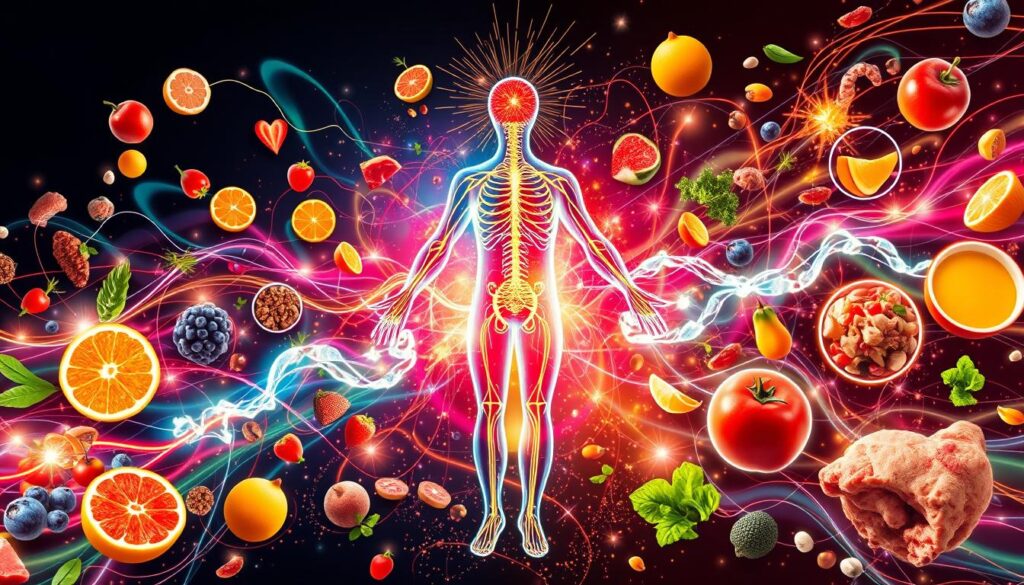Looking at the scale made my heart drop. I’d been trying to lose weight for months but nothing worked. My energy was low, and I felt stuck. So, I dove into learning about metabolism to change my health.
In this article, I’ll share how to naturally boost your metabolism for lasting weight loss. We’ll cover everything from your basal metabolic rate to the nutrients that fuel your body. You’ll learn how to rev up your metabolism and regain your energy and vitality.
Key Takeaways
- Understand the science behind your basal metabolic rate and the factors that influence it
- Discover the essential nutrients that can fire up your metabolism and support weight loss
- Explore the power of high-intensity interval training (HIIT) for metabolic enhancement
- Learn how to strategically time your meals for optimal metabolic function
- Recognize the importance of sleep quality and stress management for a balanced metabolism
- Implement effective hydration strategies to support your body’s metabolic processes
- Adopt a comprehensive, balanced approach to boost your metabolism and achieve your weight loss goals
Understanding Your Metabolic Rate and Its Impact on Weight Loss
Learning about your metabolic rate is crucial for managing your weight. Your Basal Metabolic Rate (BMR) is the minimum energy your body needs to rest. Age, genetics, and body composition all affect your metabolic rate.
Basal Metabolic Rate (BMR) Explained
BMR is how many calories your body burns when you’re not moving. It’s the energy for basic functions like breathing and organ work. Knowing your BMR helps you understand your daily calorie needs and how to lose weight.
Factors Affecting Metabolic Rate
- Age: Metabolism slows down with age, making weight loss harder.
- Gender: Men usually have a faster metabolism than women because of muscle and body composition differences.
- Body Composition: More muscle means a higher metabolic rate, as muscle burns more calories than fat.
- Genetics: Your genetic makeup can affect how fast or slow your metabolism is.
The Science Behind Metabolism and Weight Management
Metabolism is how your body turns food into energy. A faster metabolism means you burn more calories, even when resting. Knowing what affects your metabolic rate helps you make better choices for weight loss.
| Factors Affecting Metabolic Rate | Impact on Weight Management |
|---|---|
| Age | Slower metabolism makes losing weight harder as we age. |
| Gender | Men generally burn more calories than women because of their higher metabolic rate. |
| Body Composition | More muscle means a faster metabolism, helping with weight loss and maintenance. |
| Genetics | Genetics can influence how fast or slow your metabolism is, affecting weight management. |
“Understanding your metabolic rate is the first step towards unlocking your weight loss potential.”
Essential Nutrients That Fire Up Your Metabolism
Getting the right nutritional balance is key to boosting your metabolism. It helps you lose weight and live healthier. Eating the right nutrients can make your body burn fat better and digest food well.
Protein is important for a fast metabolism. It helps build muscle, which burns more calories. Choose lean proteins like chicken, fish, eggs, and legumes.
Complex carbs are also vital. They give you energy and keep your blood sugar stable. Focus on whole grains, veggies, and fruits for carbs.
Healthy fats, found in avocados, nuts, and olive oil, speed up your metabolism. They help with vitamin absorption, reduce inflammation, and give you energy.
Vitamins and minerals are also crucial. They help your body work right. Make sure you eat foods rich in iron, zinc, B vitamins, and antioxidants.
| Nutrient | Metabolic Benefits | Best Food Sources |
|---|---|---|
| Protein | Builds and maintains muscle mass, increases calorie-burning capacity | Lean meats, fish, eggs, legumes |
| Complex Carbohydrates | Provide steady energy, regulate blood sugar levels | Whole grains, vegetables, fruits |
| Healthy Fats | Help absorb fat-soluble vitamins, reduce inflammation, provide energy | Avocados, nuts, olive oil |
| Micronutrients | Support various metabolic processes | Leafy greens, citrus fruits, nuts, seeds |
Eating a balanced diet with these nutrients can boost your metabolism. It’s a big step towards a healthier life.
The best weight loss method? Click here
Strategic Meal Timing for Optimal Metabolic Function
Getting to a sustainable weight loss is all about balance. One key part is when you eat. Knowing how meal timing affects your metabolism helps you reach your weight goals.
The Importance of Breakfast for Metabolism
Breakfast is called the most important meal for a reason. Eating a healthy breakfast boosts your metabolism. It gives your body the energy and nutrients it needs all day. Skipping breakfast can slow down your metabolism and make losing weight harder.
Meal Frequency and Portion Control
- Eat 4-6 smaller meals a day instead of 3 big ones. This keeps your metabolism going and avoids blood sugar ups and downs.
- Watch your portion sizes. Be careful with how much you eat at each meal.
Evening Eating Habits
Your evening meals can also affect your metabolism. Eat light, nutritious meals in the evening to avoid storing fat. Also, be careful with snacking or late-night cravings. They can greatly impact your metabolism.

“The key to unlocking your metabolism’s full potential is to strategically time your meals and pay attention to portion sizes throughout the day.”
The best weight loss method? Click here
High-Intensity Interval Training for Metabolic Enhancement
If you want to boost your metabolism and lose fat, High-Intensity Interval Training (HIIT) is worth trying. This fitness method is great for increasing your metabolism and burning fat.
HIIT workouts are intense. They mix short, hard exercises with brief breaks. This mix boosts your metabolism and helps you burn fat faster.
- HIIT burns a lot of calories quickly. It’s tough on your heart and works your whole body. This makes burning calories more efficient.
- HIIT keeps your metabolism high even after you stop exercising. This “afterburn” effect helps you burn fat for hours.
- HIIT is quick and effective. It’s better than long, steady cardio. You can fit it into a busy schedule.
To start with HIIT, try sprinting, plyometric exercises, or high-intensity circuits. Being consistent is important. Make HIIT a regular part of your routine for better metabolism and body shape.
| HIIT Workout Benefits | Traditional Cardio |
|---|---|
| Increased Calorie Burn | Moderate Calorie Burn |
| Enhanced Post-Exercise Metabolism | Limited Post-Exercise Boost |
| Time-Efficient Workouts | Longer Duration Workouts |
HIIT can help you optimize your fitness, transform your body, and burn fat. Add it to your workout routine and see how it improves your health and well-being.
“HIIT workouts are a game-changer for anyone looking to maximize their metabolic efficiency and achieve their fitness goals. The results speak for themselves.”
Metabolism Weightloss Energy Fatburning Nutrition Health Fitness Digestion
Reaching your health and fitness goals requires understanding many factors. These include metabolism, weight loss, energy, fat burning, nutrition, health, fitness, and digestion. A holistic approach can help you unlock your body’s full potential. This leads to a healthier, more vibrant life.
Unlocking the Metabolic Puzzle
Your metabolism is like the engine of your body. It turns food into energy. It’s influenced by age, genetics, muscle mass, and hormones. Knowing your metabolic rate helps you manage weight and burn fat better.
Nourishing Your Metabolism
- Eat foods rich in metabolism-boosting vitamins and minerals. Include lean proteins, whole grains, fruits, and vegetables.
- Drink ample amounts of water all day. Dehydration slows down your metabolism.
- Don’t skip breakfast and eat at regular times. This keeps your metabolism going.
Activating Your Metabolic Powerhouse
Regular exercise, especially HIIT, boosts your metabolic rate. It helps burn fat better. Adding strength training builds lean muscle. This increases your calorie burn.
| Component | Impact on Metabolism | Recommended Strategies |
|---|---|---|
| Nutrition | Provides essential nutrients to fuel metabolic processes | Balanced diet with emphasis on whole, nutrient-dense foods |
| Physical Activity | Increases energy expenditure and builds muscle mass | Regular exercise, including HIIT and strength training |
| Stress Management | Helps regulate hormonal balance and reduces metabolic disruptions | Stress-reducing techniques, such as meditation, yoga, and adequate sleep |
Understanding metabolism, weight loss, energy, fat burning, nutrition, health, fitness, and digestion is key. It helps you create a balanced plan for your needs. This approach unlocks your body’s full metabolic potential.

Sleep Quality and Its Effect on Metabolic Health
Good quality sleep is key for our well-being and affects our metabolic health. The link between sleep and metabolism is complex. Yet, understanding it can improve our lifestyle and help with weight management.
Quality sleep helps control hormones that manage our appetite and energy use. Lack of sleep or poor sleep quality can upset these hormones. This can lead to eating more, wanting high-calorie foods, and gaining weight.
Poor sleep quality is also linked to lower insulin sensitivity and more inflammation. Both can harm metabolic function and raise the risk of diseases like type 2 diabetes and heart disease.
“Prioritizing quality sleep is one of the most impactful lifestyle changes you can make to support your metabolic health and weight management goals.”
To improve your sleep quality and boost your metabolism, try these strategies:
- Stick to a consistent sleep schedule, aiming for 7-9 hours each night.
- Make your bedroom cool, dark, and quiet for better sleep.
- Stay away from screens and stimulating activities before bed.
- Do relaxing activities, like gentle stretching or meditation, to get ready for sleep.
- Limit or avoid caffeine, alcohol, and heavy meals close to bedtime.
By focusing on quality sleep and using these tips, you can enhance your metabolism. This supports your overall health and well-being.

Hydration Strategies for Improved Metabolic Function
Drinking enough water is key for a healthy metabolism. Water helps our body process nutrients, keep temperature stable, and supports many body functions. By staying hydrated, we can boost our metabolism and help with weight management.
The best weight loss method? Click here.
Water Consumption Guidelines
The amount of water we need daily changes based on age, gender, activity level, and health. The U.S. National Academies of Sciences, Engineering, and Medicine offer these guidelines:
- For women: About 11.5 cups (2.7 liters) of water each day
- For men: Around 15.5 cups (3.7 liters) of water each day
These are just general suggestions. Your body’s specific needs might be different. Things like where you live, how active you are, and your health can affect how much water you need.
Hydration Timing and Benefits
When you drink water can also matter for your metabolism. Drinking water all day, before, during, and after meals, can help a lot. Here are some benefits:
- Enhanced Digestion: Drinking enough water helps break down and absorb nutrients better. This supports healthy digestion and metabolism.
- Increased Energy Levels: Staying hydrated can fight off tiredness and boost energy. This is important for staying active and having a healthy metabolism.
- Improved Thermoregulation: Water helps our body control temperature. This is crucial for efficient metabolism.
| Hydration Timing | Benefits |
|---|---|
| Before Meals | Helps you feel full, which can help control portions and manage weight. |
| During Meals | Helps digest and absorb nutrients, which is good for metabolic health. |
| After Workouts | Replenishes lost fluids, helps muscles recover, and supports metabolism. |
By making hydration a part of your daily routine, you can improve your metabolism. This supports your overall health and well-being.
Stress Management Techniques for Metabolic Balance
Keeping your metabolism healthy is key for managing your weight. But did you know stress can really mess with your metabolism? Chronic stress releases hormones like cortisol, which can throw off your body’s natural balance and lead to weight gain. By using effective stress management, you can get your metabolism back on track and feel better overall.
First, find out what stresses you out and how to handle it. Doing yoga or meditation regularly can help lower your stress and improve your metabolism. Also, make sure you sleep well and try relaxation methods like deep breathing or muscle relaxation. These can greatly help your metabolic health.
Also, eating a balanced diet is vital for your body’s stress response and metabolism. Eating foods that help reduce stress, like omega-3 fish, nuts, and leafy greens, can help manage stress’s effects. By focusing on stress management and a holistic health approach, you can achieve the metabolic balance you seek. This will help you on your path to lasting weight loss and better health.


